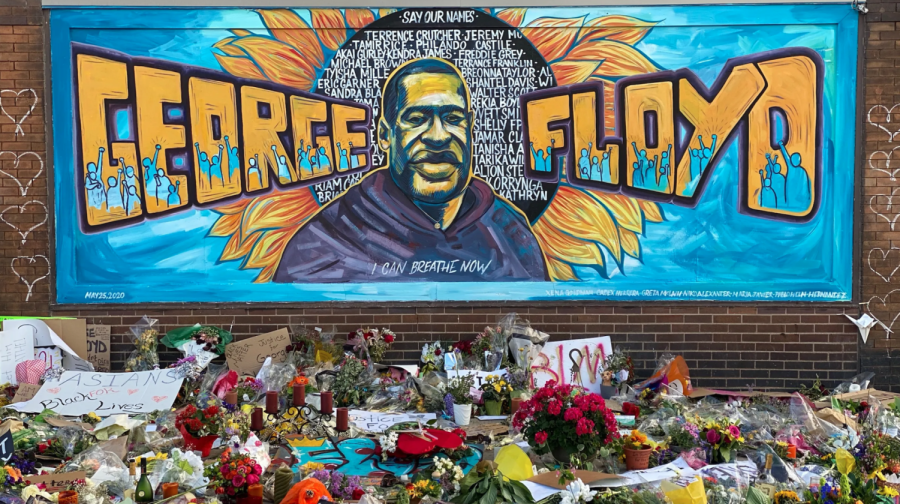The Trial of Chauvin: The Difference a Video Can Make
The loss of George Floyd has heavily impacted the city of Minneapolis and the rest of the United States.
April 7, 2021
As I traveled to my home city of Minneapolis this weekend, I felt a strong connection to the trial of Derek Chauvin that began this past week. The trial has allowed me to reflect on the murder of George Floyd, which occurred last May, and the rise of protests that followed. The reaction of the public, especially the Minneapolis community, makes this case close to home.
The trial began on Monday with opening statements from both sides. Jerry W. Blackwell, the prosecuting attorney, focused on the video of Floyd’s arrest where Chauvin kneeled on Floyd’s neck for over nine minutes. On the opposition, the defense attorneys for Chauvin asked the jurors to focus on evidence outside the video, as they believe that the case reaches far beyond what the video shows.
To put it simply, the video captured the incident that brought Chauvin to the courthouse. Based on this, why would we focus on evidence outside of the video? Asking the juror to look outside the video seems to suggest that what the public saw wasn’t what happened.
What strikes me about the case is that there is a physical recording of Chauvin killing Floyd. Despite this, there is still immense debate over whether or not he is guilty. To me it’s simple – Chauvin kneeled on Floyd’s neck and Floyd died. Thus, Chauvin murdered him.
I think that all the Minneapolis residents have felt like witnesses to the event because this video that flooded social media across the world occurred on our very own streets. Witnesses have proven to be very powerful in the case thus far. The emotional rawness of each testimony reveals the impact that this case has had on the witnesses’ lives.
A very powerful testimony came from Darnella Frazier, who was 17 at the time when she filmed the infamous video of the murder that prompted a wave of public outrage and movement for change. In her testimony, she said that the video altered her life in many ways and that she has deeply regretted not physically intervening at the scene where Floyd was murdered.
Frazier recounted what she remembered:
“He cried for his mom,” she said. “He was in pain. It seemed like he knew it was over for him. He was terrified. He was suffering. This was a cry for help,” according to MSNBC.
Frazier explained that when she looks at Floyd, she sees her dad, her brothers and her other relatives. She feels this way because they are all Black too. She stated how she often reflects on how Floyd could have been one of her family members. Witnessing this tragic event has impacted her in numerous ways as she worries now about the safety of those she loves as well as herself.
Frazier was also with a nine-year old girl who stated that when she saw what was happening to Floyd she “Was sad and kind of mad. It felt like he [Chauvin] was stopping his [Floyd’s] breathing, and it was kind of like hurting him” (MSNBC).
The raw emotional reaction of a nine-year old girl speaks volumes as to what happened to Floyd on May 25. Kids tend to say it like it is, radiating honesty, and this young girl says outright that Chauvin was hurting Floyd, which in turn made her feel mad inside. The innocence behind this specific witness testimony speaks to how this case is universally upsetting on a deep level.
The large takeaway for me is that the murder of Floyd has reached people in unthinkable ways. It has not only affected the witnesses but our entire country. In a way, we are all witnesses to this tragedy and along with that, we are handed a large responsibility. It is now the responsibility of our country to move forward productively by looking inward.
Floyd’s murder is not an isolated incident. Racism is flourishing in our country as we speak. While most of us have recognized the impact of racism in our police system and beyond, we must each do better by educating ourselves and knowing that speaking up can make a difference.
Frazier can lead as an example for all of us. She decided to film the occurrence on May 25, and because of this choice, Chauvin has a greater chance of being proven guilty. Frazier’s actions reveal that we each have a voice, and our daily choices can have a large impact on moving towards justice and equality in our country.


